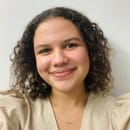At Her Campus, we’re known for our preppy tone, and our relatable articles, but for the moment, we’re going to dive into the world of dystopian fiction and the impact media has on us.
Dystopian fiction invites readers to wake up and breathe in their current landscapes, as well as invited to observe through distorted lenses.
For instance, take the red herds of handmaids in Gilead from The Handmaid’s Tale. The character Offred is our peephole into a life where an authoritarian regime completely oppressed fertile women into being sex slaves nationwide.
Black Mirror broadcasts a cultural spectrum where your image is everything. Imagine having your ethics and morals traded in for market value. “Fifteen Million Merits” shows media as an authoritarian regime and how Abby, a contestant for a talent show, ended up objectified under the media’s scope.
It’s insane how phones control us nowadays; think about it, we use it practically for everything. We log into Twitter like it was the morning paper, Uber is like our car keys, Instagram is our lifestyle hub, podcasts are bubbles that shut out surroundings, and our money is in a digital wallet. Lacy’s world took it up a notch though. In another episode of Black Mirror, Nose Dive, phones rated people’s self-worth through social media. The ratings, eerily named likes, acted as a currency, and Lacy failed at something very important: authenticity. She strived to be perfect and lost her organic personality.
Unlike Lacy, Abby from “Fifteen Million Merits” was authentic. She sparkled where television screens served as wallpaper, confining people in a gray world. She competed in a talent show where contestants performed before three judges: Wraith, Hope and Charity. Abby sang, and the robotic-like judges noticed her individuality; unfortunately, only to objectify her into Wraith’s porno channel. Charity dehumanized her by pointing out, “You’re furniture at best.”
Art by VarshaVijayan
Taken out of context, Charity’s remark highlights women’s social condition that has spanned through time. Women have spent history under someone else’s rule. Has the media turned into an undercover, authoritarian regime for women? Is it turning women against each other?
Nowadays, influencers upload lavish lifestyles and serve as spokespersons for brands, endorsing products that claim to add value to their daily lives.
The company Passport published a social investigation of women’s behavior within education, workplace, homes, and the internet the past year. According to Powerful Women: Reworking the Global Role Model (October 2018), women have turned into huge brand influencers.
The study shows that consumers relate more to influencers than celebrities. For women, these products tend to give youthful glows, or they’re trendy fashion items. For Naked Juice, their sales increased 80% from 2012 to 2017 thanks to female influencers posting images of them drinking the juice, with enticing captions, on their Instagram feeds and endorsing the product as their beauty and health remedy. Keep in mind that this is just a juice company!
Female consumers scroll through their feeds, see these ideal realities and can’t help but wonder what it must be like to live in a world where overly sugared juices provide a youthful complexion. The good thing about fiction is that it’s fantasy; although, they also serve as a (pun intended) mirror to reflect our faulty realities. (Funny how it takes artistic and creative remedies to alert a society that devalues or isolates uniqueness).
Let’s not allow the media to control our communication skills. Free your quirky and unique personas. Instead of allowing social platforms to make us uniform, use it to globalize your originality. Besides, it can be a good thing that women are taking control over the media. Let’s change and control the scope. We’re emerging as natural born leaders, passionate for global political issues, owning start-up businesses and influencing media.


